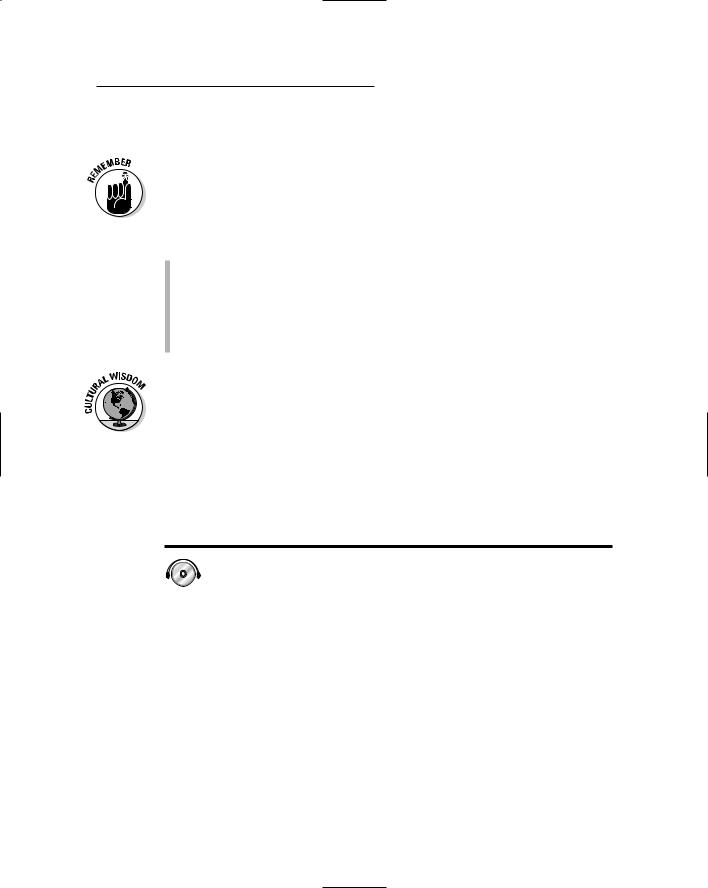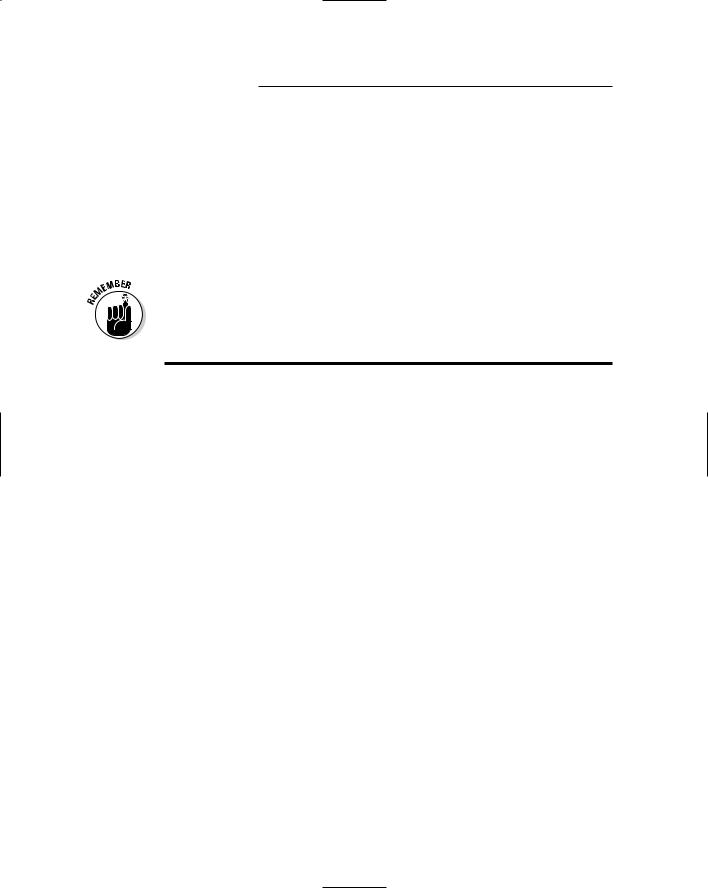
Russian For Dummies
.pdf
104 Part II: Russian in Action
After the sup comes the main course, usually called vtoroye (ftah-roh-ee; Literally: second course). Here are some typical Russian favorites:
bifshtyeks (beef-shtehks; beefsteak)
bifstroganov (behf-stroh-guh-nuhf; beef Stroganoff)
gamburgyer (gahm-boor-geer; hamburger) Russians are still getting used to this one, but they do prefer kotlyety to gamburgyery; old habits die hard
golubtsy (guh-loop-tsih; stuffed cabbage rolls)
griby (gree-bih; mushrooms)
kotlyety (kaht-lye-tih; ground meat patties)
kotlyety s kartoshkoj (kaht-lye-tih s kuhr-tohsh-kuhy; meat patty with potatoes)
kuritsa (koo-ree-tsuh; chicken)
makarony (muh-kuh-roh-nih; pasta)
pitsa (pee-tsuh; pizza) This one is a relative novelty in Russian cuisine.
pyechyen’ (pye-cheen’; liver)
ryba (rih-buh; fish)
schnitzyel’ (shnee-tsehl’; schnitzel)
sosiski (sah-sees-kee; frankfurters)
zharkoye (zhuhr-koh-ee; any meat cooked in oven)
The main course is usually served with kartoshka (kuhr-tohsh-kuh; potatoes), makarony (muh-kuh-roh-nih; pasta), and ris (rees; rice), and it’s always served with khlyeb (khlep; bread).
After the main course comes dyesyert (dee-syert; dessert), or tryet’ye (trye- t’ee; third course). This course usually consists of some kind of tort (tohrt; cake) or a sweet drink called kompot (kahm-poht; compote) or kisyel’ (kee- syel’; drink made of fruit and starch). Another common dessert favorite is morozhenoye (mah-roh-zhih-nuh-ee; ice-cream).
For those who insist on Western-style dessert, you can find pyechyen’ye (pee-chyen’-ee; cookies), pirog (pee-rohk; pie), and tort (tohrt; cake).
Some typical beverages that Russians drink in the middle of the day are sok (sohk; juice), chaj (chahy; tea), kofye (koh-fye; coffee), and voda (vah-dah; water), although the latter doesn’t enjoy as much popularity as it does in the U.S., for example.

Chapter 5: Making a Fuss about Food 105
A simple supper
The last meal of the day is called uzhin (oo-zhihn; supper), and it’s usually eaten with the family around the kitchen or dining room table. Just as with obyed (dinner; see the previous section), soup and a main course are often served for uzhin. Butyerbrody (boo-tehr-broh-dih; open-sided sandwiches) may also be served, and several cups of chaj (chahy; tea) often conclude the evening meal. Some other Russian supper favorites include:
blinchiki (bleen-chee-kee; crepes)
pyel’myeni (peel’-mye-nee; Russian ravioli)
syrniki (sihr-nee-kee; patties made of cottage cheese)
tvorog so smyetanoj (tvoh-ruhk suh smee-tah-nuhy; cottage cheese with sour cream)
Russians believe that breakfast, the most important meal of the day, should be plentiful, while supper should be light. Russian folk wisdom says: “Eat your breakfast yourself, share your dinner with a friend, give your supper to your enemy.” Gosh, with enemies like that, who needs friends? As for suppertime beverages, chaj (chahy; tea) is certainly the most popular drink. A very healthy habit is having a glass of kyefir (kee-feer; buttermilk) before going to bed. Contrary to Westerners’ beliefs, Russians don’t drink alcoholic drinks with supper unless it’s a very special occasion.
Talkin’ the Talk
Syeryozha came home early from school because he has a stomachache. His mother is concerned that it may be food poisoning.
Syeryozha’s mother: |
Syeryozha, pochyemu ty tak rano |
|
prishyol iz shkoly? Chto sluchilos’? |
|
see-ryo-zhuh, puh-chee-moo tih tahk |
|
rah-nuh pree-shohl ees shkoh-lih? shtoh |
|
sloo-chee-luhs’? |
|
Syeryozha, why did you come from |
|
school so early? What happened? |
Syeryozha: |
Mama, u myenya bolit zhivot. |
|
mah-muh, oo mee-nya bah-leet zhih- |
|
voht. |
|
Mom, I have a stomachache. |
Syeryozha’s mother: |
Zhivot? Chto ty syegodnya yel na |
|
zavtrak? |

106 Part II: Russian in Action
|
zhih-voht? shtoh tih see-vohd-nye yel |
|
nuh zahf-truhk? |
|
Stomachache? What did you have for |
|
breakfast today? |
Syeryozha: |
Ya yel kashu i pil moloko. |
|
ya yel kah-shoo ee peel muh-lah-koh. |
|
I had hot cereal and drank milk. |
Syeryozha’s mother: |
A chto ty yel v shkolye na obyed? |
|
uh shtoh tih yel f shkoh-lee nuh |
|
ah-byet? |
|
And what did you eat for lunch at school? |
Syeryozha: |
Na obyed ya yel salat, kotlyety s kar- |
|
toshkoj i pil kisyel’. |
|
nuh ah-byet ya yel suh-laht, kaht-lye- |
|
tih s kahr-tohsh-kuhy ee peel kee-syel’. |
|
For lunch I had salad, meat patty with |
|
potatoes, and drank kissel. |
Syeryozha’s mother: |
A chto tih yel na pyervoye? |
|
uh shtoh tih yel nuh pyer-vuh-ee? |
|
And what did you eat for the first course? |
Syeryozha: |
Ya, nichyego nye yel. Ya nye khotyel sup. |
|
ya nee-chee-voh nee yel. ya nee khah- |
|
tyel soop. |
|
I did not eat anything. I did not want to |
|
eat soup. |
Syeryozha’s mother: |
Syeryozha, ty dolzhyen yest’ sup |
|
kazhdyj dyen’. Mozhyet byt’ u tyebya |
|
bolit zhivot, potomu chto ty nye yesh’ |
|
sup. Ty khochyesh yest’? |
|
see-ryo-zhuh, tih dohl-zhihn yest’ soop |
|
kahzh-dihy dyen’. moh-zhiht biht’ oo tee- |
|
bya bah-leet zhih-voht, puh-tah-moosh- |
|
tuh tih nee yesh’ soop. tih khoh-cheesh |
|
yest’? |
|
Syeryozha, you have to eat soup every |
|
day. Maybe you have a stomachache |
|
because you don’t eat soup. Are you |
|
hungry? |
Syeryozha: |
Nyet, ya nye khochu yest’ sup. Ya |
|
khochu pit’. |
|
nyet, ya nee khah-choo yest’ soop. ya |
|
khah-choo peet’. |
|
No, I don’t want soup. I’m thirsty. |

|
|
|
Chapter 5: Making a Fuss about Food 107 |
|
|
|
|
||
|
Syeryozha’s mother: |
Chto ty khochyesh’ pit’? Ty khochyesh’ |
||
|
|
chaj? |
||
|
|
shtoh tih khoh-cheesh’ peet’? tih khoh- |
||
|
|
cheesh’ chahy? |
||
|
|
What do you want to drink? Do you |
||
|
|
want tea? |
||
|
Syeryozha: |
Da, khochu. |
||
|
|
dah khah-choo. |
||
|
|
Yes, I do. |
||
|
Syeryozha’s mother: |
Khorosho, syejchas ya sdyelayu chaj. |
||
|
|
khuh-rah-shoh, see-chahs ya sdye-luh-yu |
||
|
|
chahy. |
||
|
|
Okay. I’ll make tea. |
||
|
|
|
|
|
Words to Know
Chto sluchilos’? |
shtoh sloo-chee-luhs’ |
What happened? |
U myenya bolit |
oo mee-nya bah-leet |
I have a |
zhivot. |
zhih-voht |
stomachache. |
Iz shkoly |
ees shkoh-lih |
From school |
Chto ty yel? |
shtoh tih yel |
What did you eat? |
Na zavtrak |
nuh zahf-truhk |
For breakfast |
Na obyed |
nuh ah-byet |
For lunch |
Na pyervoye |
nuh pyer-vuh-ee |
For the main |
|
|
course |
Ya nichyego |
ya nee-chee-voh |
I didn’t eat |
nye yel. |
nee yel |
anything. |
Mozhyet byt’ |
moh-zhiht biht’ |
Maybe |
Potomu chto |
puh-tah-moo-shtuh |
Because |
Chto ty khochyesh’ |
shtoh tih khoh- |
What do you want |
pit’? |
cheesh’ peet’? |
to drink? |

108 Part II: Russian in Action
Going Out for Groceries
If you want to make a quick trip to the produktovyyj magazin (pruh-dook-toh- vihy muh-guh-zeen; grocery store) or spend a leisurely day at the Russian rynok (rih-nuhk; market), you have to know how to buy food products in Russian. In the following sections, we tell you all the different things you can buy.
Picking out produce
Buying produce at a farmer’s market is very common. Russians are convinced that produce is much fresher there than in regular grocery stores. Table 5-3 has a list of some of the more popular produce items you may want to buy:
Table 5-3 |
Produce |
|
Russian |
Pronunciation |
Translation |
yabloki |
ya-bluh-kee |
Apple |
|
|
|
svyokla |
svyok-luh |
Beets |
|
|
|
chyernika |
cheer-nee-kuh |
Blueberry |
|
|
|
kapusta |
kuh-poos-tuh |
Cabbage |
|
|
|
morkov’ |
mahr-kohf’ |
Carrots |
|
|
|
vishnya |
veesh-nye |
Cherry |
|
|
|
ogurtsy |
uh-goor-tsih |
Cucumber |
|
|
|
balkazhany |
buhk-luh-zhah-nih |
Eggplant |
|
|
|
chyesnok |
chees-nohk |
Garlic |
|
|
|
vinograd |
vee-nah-grahd |
Grape |
|
|
|
luk |
look |
Onion |
|
|
|
grushi |
groo-shih |
Pears |
|
|
|
gorokh |
guh-rohkh |
Peas |
|
|
|
pyeryets |
pye-reets |
Pepper |
|
|
|
ryediska |
ree-dees-kuh |
Radish |
|
|
|
malina |
muh-lee-nuh |
Raspberry |
|
|
|
klubnika |
kloob-nee-kuh |
Strawberry |
|
|
|

Chapter 5: Making a Fuss about Food 109
Russian |
Pronunciation |
Translation |
pomidory |
puh-mee-doh-rih |
Tomato |
|
|
|
arbuz |
uhr-boos |
Watermelon |
|
|
|
Surveying other grocery items
Chances are, most of the food items you want to buy can be found at the rynok, but you can also buy the food products you need at produktovyye magaziny (pruh-dook-toh-vih-ee muh-gah-zee-nih; grocery stores). We list some of the most common food items in Table 5-4.
Table 5-4 |
Common Food Items |
|
Russian |
Pronunciation |
Translation |
myaso |
mya-suh |
Meat |
|
|
|
govyadina |
gah-vya-dee-nuh |
Beef |
|
|
|
farsh |
fahrsh |
Ground beef |
|
|
|
kuritsa |
koo-ree-tsuh |
Chicken |
|
|
|
ryba |
rih-buh |
Fish |
|
|
|
vyetchina |
veet-chee-nah |
Ham |
|
|
|
baranina |
buh-rah-nee-nuh |
Lamb |
|
|
|
svinina |
svee-nee-nuh |
Pork |
|
|
|
kolbasa |
kuhl-buh-sah |
Sausage |
|
|
|
maslo |
mahs-luh |
Butter |
|
|
|
kyefir |
kee-feer |
Buttermilk |
|
|
|
syr |
sihr |
Cheese |
|
|
|
yajtsa |
yahy-tsuh |
Eggs |
|
|
|
moloko |
muh-lah-koh |
Milk |
|
|
|
smyetana |
smee-tah-nuh |
Sour cream |
|
|
|
jogurt |
yo-goort |
Yogurt |
|
|
|
bubliki |
boob-lee-kee |
Bagels |
|
|
|
(continued)

110 Part II: Russian in Action
Table 5-4 (continued)
Russian |
Pronunciation |
Translation |
khlyeb |
khlyep |
Bread |
|
|
|
chyornyj khlyeb |
chyor-nihy khlyep |
Dark bread |
|
|
|
bulka |
bool-kuh |
White bread |
|
|
|
kofye |
koh-fye |
Coffee |
|
|
|
sok |
sohk |
Juice |
|
|
|
chaj |
chahy |
Tea |
|
|
|
voda |
vah-dah |
Water |
|
|
|
muka |
moo-kah |
Flour |
|
|
|
majonyez |
muh-ee-nehs |
Mayonnaise |
|
|
|
gorchitsa |
gahr-chee-tsuh |
Mustard |
|
|
|
makarony |
muh-kuh-roh-nih |
Pasta |
|
|
|
pyeryets |
pye-reets |
Pepper |
|
|
|
ris |
rees |
Rice |
|
|
|
sol’ |
sohl’ |
Salt |
|
|
|
sakhar |
sah-khuhr |
Sugar |
|
|
|
podsolnechnoye maslo |
paht-sohl-neech-nuh-ee mahs-luh |
Sunflower oil |
|
|
|
Eating Out with Ease
Eating out at Russian restaurants and cafes can be a lot of fun, especially if you know Russian. In the following sections, we go over the different kinds of restaurants you can go to, how to reserve your table, the right way to order a meal, and how to pay your bill.
Deciding on a place to eat
You can find lots of different places to eat out, Russian-style, depending on your mood and budget. If you’re in the mood for a night of culinary delights, with a full eight-course meal, lots of drinks, and live music, check out a fancy Russian ryestoran (ree-stah-rahn; restaurant). Be sure you have a healthy budget and are well-rested, because prices are steep and you won’t be coming home ’til the wee hours of the morning!

Chapter 5: Making a Fuss about Food 111
A more affordable everyday option is a kafye (kuh-feh; café), which can serve anything from coffee and ice-cream, to pancakes, to pies. Cafés are usually privately owned and have such interesting names (often unrelated to food) that if you pass one of them on the street, you may not even recognize it as a place to eat! But if you follow that delicious smell under your nose, you may wind up at one of these delightful little places:
blinnaya (blee-nuh-ye; café that serves pancakes)
chyeburyechnya (chee-boo-ryech-nuh-ye; café that serves meat pies)
kafye-morozhenoye (kuh-feh mah-roh-zhih-nuh-ee; ice-cream parlor)
pirozhkovya (pee-rahsh-koh-vuh-ye; café that serves small pies)
pyel’myennya (peel’-myen-nuh-ye; place that serves Russian ravioli)
pyshyechnaya (pih-shihch-nuh-ye; donut shop)
stolovaya (stah-loh-vuh-ye; dining room)
zakusochnaya (zuh-koo-suhch-nuh-ye; snack bar)
Making reservations on the phone
After you decide which restaurant to go to, pick up the phone and make a reservation. And don’t worry. The person answering the phone has probably dealt quite often with customers whose Russian isn’t perfect. He or she will be happy to help you:
If you’re a man, say, Ya khotyel by zakazat’ stolik na syegodnya. (ya khah-tyel bih zuh-kuh-zaht’ stoh-leek nuh see-vohd-nye; I’d like to reserve a table for tonight.)
If you’re a woman, say, Ya khotyela by zakazat’ stolik na syegodnya.
(ya khah-tye-luh bih zuh-kuh-zaht’ stoh-leek nuh see-vohd-nye; I’d like to reserve a table for tonight.)
When you say ya khotyel(a) by, you’re using Russian subjunctive mood. It’s one of the easiest things in Russian grammar. You just use the past tense of the verb + the word by. (For more on forming past tense, see Chapter 2.) Instead of saying the word stol (stohl; table), Russians like to use the diminutive form stolik (stoh-leek; Literally: little table) when making restaurant reservations.
If you want to reserve a table for tomorrow, just replace the phrase na syegodnya (nuh see-vohd-nye; for today) with the phrase na zavtra (nuh zahf- truh; for tomorrow). If you want to specify a day of the week, use the same preposition na + the day of the week in accusative case. (See Chapter 7 for the days of the week.) So if you want to make a reservation for Saturday and you’re a male, you say Ya khotyel by zakazat’ stolik na subbotu. (ya khah- tyel bih zuh-kuh-zaht’ stoh-leek nuh soo-boh-too; I’d like to reserve a table for Saturday.)

112 Part II: Russian in Action
What you’ll probably hear in response is Na skol’ko chyelovyek? (nuh skohl’- kuh chee-luh-vyek?; For how many people?) To answer this question, decide (quickly, Russians are very impatient on the phone!) how many people are accompanying you, add yourself, and after these quick calculations say one of these phrases:
na dvoikh (nuh dvah-eekh; for two)
na troikh (nuh trah-eekh; for three)
na chyetvyerykh (nuh cheet-vee-rihkh; for four)
na odnogo (nuh uhd-nah-voh; for one person)
The person on the phone will probably want to know by what time the table should be ready for you, and he or she will ask Na kakoye vryemya? (nuh kah-koh-ee vrye-mye; For what time?) To answer this question, use the preposition na (nah; for) + the time when you’re planning to arrive:
na syem’ chasov (nuh syem’ chah-sohf; for 7 o’clock)
na vosyem’ chasov (nuh voh-seem’ chah-sohf; for 8 o’clock)
(For more info on specifying the time, see Chapter 7.) Also be prepared to give your name, which you do by simply stating it.
Don’t expect to be asked whether you want to sit in the smoking or nonsmoking section. Too many people in Russia smoke (especially when drinking alcoholic beverages) and smokers rule. Even those people who don’t generally smoke tend to smoke in restaurants.
The art of ordering a meal
After you arrive at the restaurant and are seated by myetrdotyel’ (mehtr-dah- tyel; maitre d’), the ofitsiant (uh-fee-tsih-ahnt; waiter) or ofitsiantka (uh-fee- tsih-ahnt-kuh; waitress) will bring you a myenyu (mee-nyu; menu). In a nice restaurant, all the dishes in the menu are usually in English as well as Russian.
When you open the menu, you’ll notice it’s divided into several subsections, which is how items are usually eaten and ordered in a Russian restaurant:
zakuski (zuh-koos-kee; appetizers)
supy (soo-pih; soups)
goryachiye blyuda (gah-rya-chee-ee blyu-duh; main dishes)
sladkiye blyuda (slaht-kee-ee blyu-duh; dessert)
alkogol’nye napitki (ahl-kah-gohl’-nih-ee nuh-peet-kee; alcoholic drinks)
bezalkogol’niye napitki (beez-uhl-kah-gohl’-nih-ee nuh-peet-kee; nonalcoholic beverages)

Chapter 5: Making a Fuss about Food 113
When the waiter asks you Chto vy budyetye zakazyvat’? (shtoh vih boo-dee- tee zuh-kah-zih-vuht’; What would you like to order?), just say Ya budu + the name of the item you’re ordering in the accusative case. (On forming the accusative, see Chapter 2.) For example, you may say something like: Ya budu kotlyetu s kartofyelyem i salat iz pomidorov. (ya boo-doo kaht-lye-tih s kahr-toh-fee-leem ee suh-laht ees puh-mee-doh-ruhf; I’ll have meat patty with potatoes and tomato salad.)
The waiter may also ask you specifically Chto vy budyetye pit’? (shtoh vih boo-dee-tee peet’; What would you like to drink?) To answer, you simply say Ya budu (ya boo-doo; I will have) + the name of the drink(s) you want in the accusative case. So, if at dinner you’re extremely thirsty (and aren’t the designated driver), you may say Ya budu vodku i sok i butylku vina. (ya boo-doo voht-koo ee sohk ee boo-tihl-koo vee-nah; I’ll have vodka and juice and a bottle of wine.) For details on the accusative case, see Chapter 2.
Waiters and waitresses don’t take your drink orders before you start ordering meals; expect to be asked what you want to drink at the end of your order. Moreover, when the waiter asks this question, he’s asking about alcoholic beverages. Water or soda with your meal isn’t as common as it is in the West. As a matter of fact, many Russians believe that one shouldn’t chase food with water or any other beverage because it interferes with food digestion.
When you say Ya budu + the food or drink item, what you’re really saying is Ya budu yest’ . . . (ya boo-doo yest’; I will eat . . .) or Ya budu pit’ . . . (ya boo- doo peet’; I will drink . . .) The verbs yest’ (yest’; to eat) and pit’ (peet’; to drink) force the noun coming after them into the accusative case, because it’s a direct object. When you order, you skip the verbs yest’ and pit’, but they’re implied. (On uses of the accusative case, see Chapter 2.)
When you’re done ordering, you should say Vsyo! (fsyo; That’s it!) Otherwise, the waiter will keep standing next to you, waiting for you to order more.
Having handy phrases for the wait staff
In this section, we include some helpful phrases you may want to use when ordering or receiving a meal or drinks.
If you’re a vegetarian, the best way to ask about vegetarian dishes is to say:
Kakiye u vas yest’ vyegyetarianskiye blyuda? (kuh-kee-ee oo vahs yest’ vee- gee-tuh-ree-ahns-kee-ee blyu-duh; What vegetarian dishes do you have?) Note, however, that being a vegetarian in Russia is still seen as a very bizarre habit.
Imagine that you’re a vegetarian and you’re sitting in a restaurant waiting for the vegetarian dish you ordered. Instead, the waiter puts in front of you a steaming, juicy beefsteak with potatoes. What do you do? Before that waiter is gone, say Ya eto nye zakazyval/zakazyvala! (ya eh-tuh nee zuh-kah-zih- vuhl/zuh-kah-zih-vuh-luh; I did not order this!) (Use zakazyval if you’re a man, and zakazyvala if you’re a woman.)
